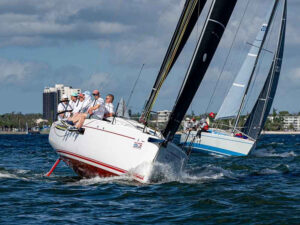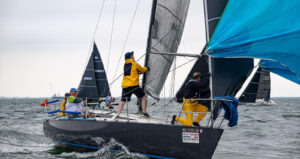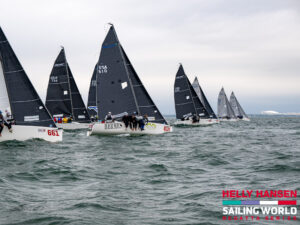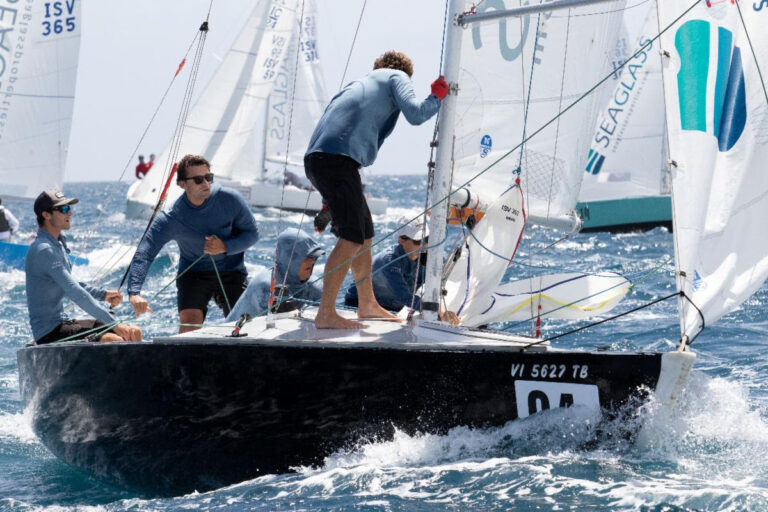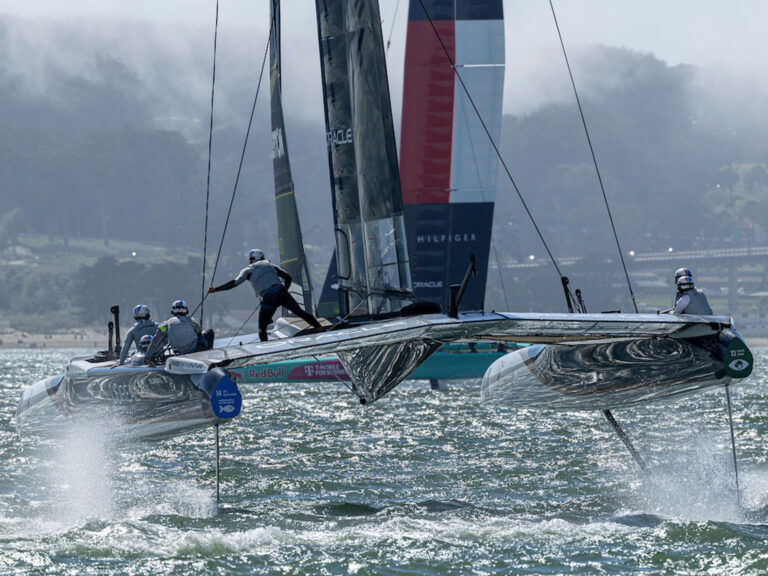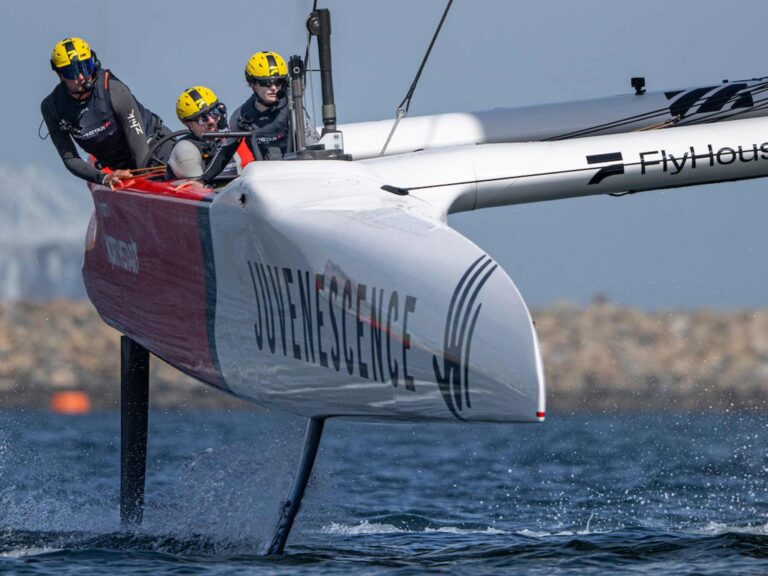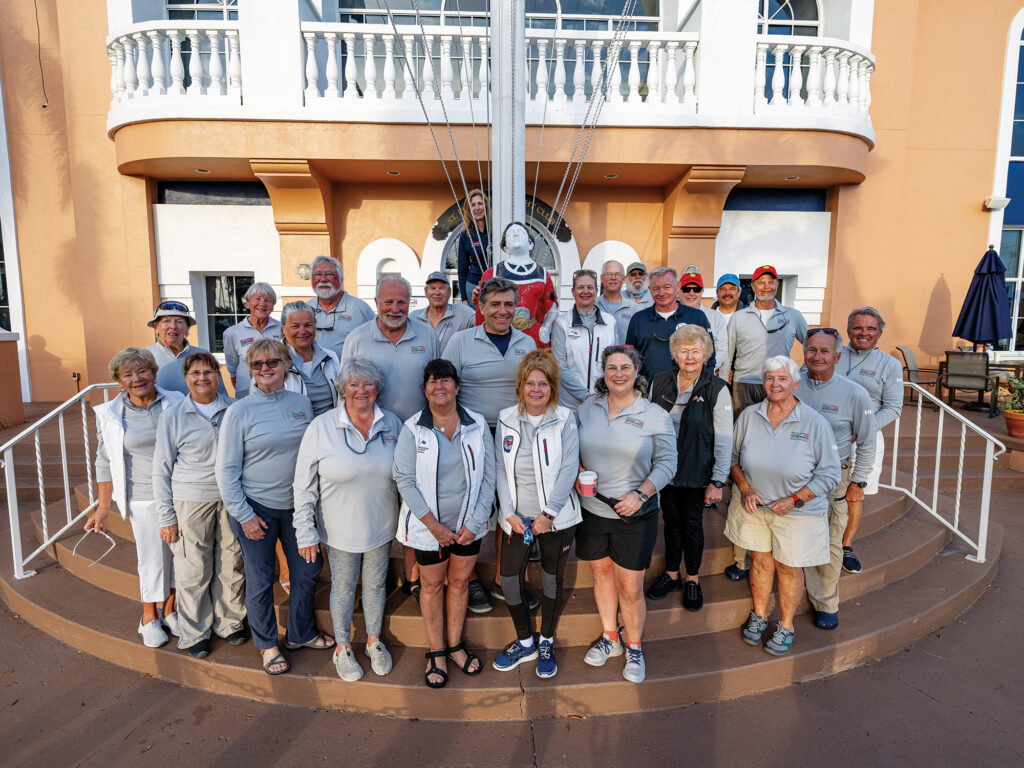
never before in our lifetime have we been so reliant on technology. For an aging Gen Xer, it’s a frightening and dangerous place to be. Our phones are loaded with apps that drive and distract our daily lives. We’re shackled to our computers for productivity, creativity and connection. And even on the racecourse now, once a place of digital escape, we’re less able to get around the buoys without staring at displays, or now having a screen to tell us how close we are to the starting line.
Indeed, digital creep into every aspect of our sport is real, but when tech eventually glitches—as we know it will—we find ourselves either apoplectic, confused, angry or unsure what to do. We might ask ourselves what we did before we became so reliant on technology. Why do we have to know right now?
In the months leading up to the first regatta of our 2025 Helly Hansen Sailing World Regatta Series in St. Petersburg, Florida, our event team knew that they were staring down a regatta-management-system apocalypse. Yacht Scoring—the ubiquitous and antiquated platform that we and hundreds of regattas rely on for event registration, payments, communications, scoring and so much more—was unexpectedly and haphazardly relaunched late in 2024. It was prettier on the surface, but behind the walls were more bugs than a seedy interstate motel.
The event and club teams scrambled to implement plans B, C and D, but even before nearly 200 skippers lined up outside the registration room to complete the process, organizers were bracing for the nightmare.
St. Petersburg YC’s experienced and dedicated volunteer army kept the in-person registration proceedings to a snail’s pace. The standing line weaved through the building as competitors patiently waited their turn to complete the entry process and pick up their essential race documents and swag bag. The lucky ones were getting drinks delivered from the bar by caring crewmates.
The unlucky ones grumbled, obsessively looking at their watches and then the same photograph on the wall they’d been staring at for the previous 10 minutes. There was one silver lining, which one skipper candidly shared with me. He felt as if he were standing at a receiving line at a wedding. He was having fun catching up with friends as they passed by toward the back of the line.
Registration was, perhaps, the “easy” part without a functioning system. Another hurdle was communications. Most of us can remember the days when the official noticeboard was the go-to physical location for all essential race-committee notices. Every morning before dockout, someone on the team would pay it a visit. Then hours after racing, we’d pile shoulder to shoulder, maneuvering for a closer view of the scores and protest logs printed on white paper and pinned to corkboards. These too were gathering places where we commiserated or celebrated our and other’s results. I kind of miss those days.
It’s all digi now. We log in, follow a QR code or link, or stare at a television as scores scroll slowly past our eyeballs. Sipping our rum while we wait. Now our essential race notices are dispatched digitally by whatever race-management platform. This, we know, is problematic. The breakdown of Yacht Scoring before the regatta already had the team scrambling to shift communications protocol to emails and WhatsApp chats.
While these were effective means for most competitors, the exercise highlighted a real challenge for others who missed the updates—distance racers, for example, who may or may not get updated waypoints. When we’re hustling to park, get to the boat, tune the rig, load the right headsails on board, then get off the dock on time, it’s easy to miss those messages, especially when your phone is in the chart table or deep in the community dry bag.
In the old days, it all seemed simpler: Check the noticeboard on the way to the boat, hit the head, and wait for further instructions on the VHF on the water.
Perhaps our communications weren’t perfect, but this too came to pass in St. Pete, in no small part thanks to the yacht club’s experienced communications team skillfully crafting WhatsApp updates at key times throughout the day.
The real bull in this china shop of digital horrors, however, was scoring. In the old days, we wrote down our finishes, and we were OK with the scores not being posted until the rum pour was well underway. Today our on-demand desire results in anxiety and teeth gnashing when the scores aren’t posted on time—or, God forbid, are wrong. I get it; we live in an age where technology should enable us to know the results the moment we cross the finish line. The emergent race-management platforms of Vakaros and Velocitek are well on their way to doing that, but what then, when and if they glitch?
We go back to paper. And people.
So, here was the real heroism in St. Pete. With Yacht Scoring being a wreck abandoned on a reef and 14 fleets to score, including ORC and three PHRF distance-race fleets, the miracles made behind the curtains at the club were astounding. Volunteers and yacht-club staff rolled up sleeves and pummeled through results, finish times, handicaps and an onslaught of scoring inquiries, laboriously plugging digits into spreadsheets.
Volunteers and yacht-club staff rolled up sleeves and pummeled through results, finish times, handicaps and an onslaught of scoring inquiries, laboriously plugging digits into spreadsheets.
One morning, I overheard one of them say that all they could see when they closed their eyes to sleep was floating numerals. For a man of words, that’s terrifying.
I witnessed the frustration of so many competitors, understandably eager to know exactly where they stood in the fleet pecking order. A few were seriously ticked off at our ineptitude.
“Dude, what’s with the messed-up scores?” they asked. To diffuse the tension, I would lightheartedly opine that experts tell us we shouldn’t be looking at the scores until the final race anyway. One skipper gave me a stink eye and said: “No. I want to know. When will they be done?”
The whole situation eventually brought someone to tears, and I tried to comfort them with a heaping pile of reality: The racing that the sailors were enjoying on the water was outstanding—sunshine, great breeze, elbows-out one-design and distance racing. The best assembled race-committee team in all of Florida was banging out races. The parties were jamming, the rum was going fast, and the St. Pete nightlife was off the hook. Don’t sweat it. Results matter only to those actually keeping score.
In a mad rush on Sunday afternoon of the regatta, we had “final” scores for the awards show, and even those were wrong for the PHRF sailors—to which I extend my most sincere apologies. Two teams were denied the stage, and they were certainly worthy of it for having raced two incredibly challenging distance races. Otherwise, awards were given, pictures taken. All good.
Our Yacht Scoring experience does, however, make me lament our sport’s digital dependency. We now have robotic marks, laser-sharp OCS software, tablets that tell us when to tack, and racks of displays to stare at. That’s all fine and good development, but when we get to AI software calling real-time tactics, we are, indeed, screwed.
The same is true if we become too reliant on technology to enjoy our sport. If, and when, something goes haywire, as it almost did in St. Pete, we can always rely on ourselves to deliver the outcome we desire. I’m talking about the volunteers, race-committee officials, mark boaters, rode haulers, flag raisers, recorders, scorers, judges and the club staff smiling in the photo at the beginning of this article. And the event team, of course. Because of them we go racing and enjoy ourselves. And unlike our software platforms, they didn’t glitch.

